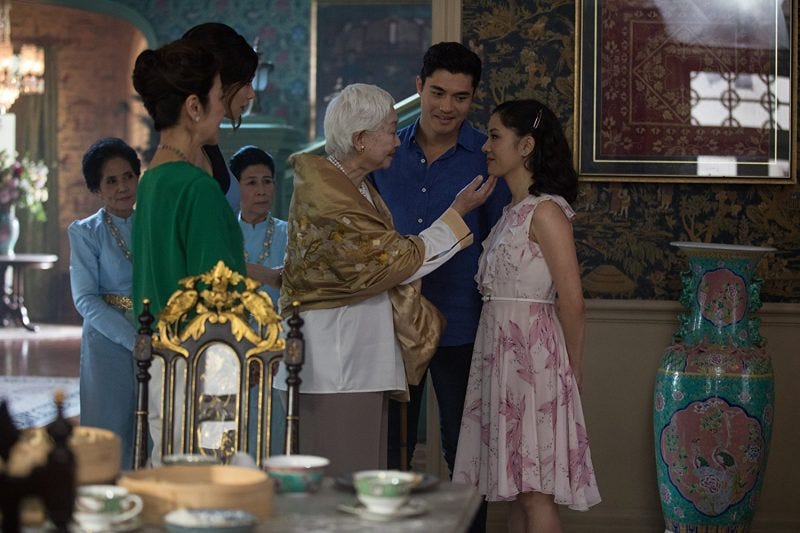Crazy Rich Asians

To me, 2018 has become the year where Hollywood finally decides to release projects that are "risky" to them but no-brainers to moviegoers. In the span of eight months, there has been a black superhero film with a majority African American cast, a John Hughes-esque film about a teenager struggling to come out as gay, and a bigger budget heist film with a star-studded female cast. All of them did very well which, unless you've been under a rock for centuries, is not surprising. Times have been changing for awhile now and regardless of any other personal affiliations, most people agree that big budget movies not led by straight, white guys shouldn't be considered rare in this day and age. Neverless, it's nice to see that diversity is starting to make its way into bigger/blockbuster films. Which brings me to Jon M. Chu's "Crazy Rich Asians," an adaptation of the best-selling 2013 novel that takes the standard romantic comedy formula and unapologetically mixes it in with the adapted material's Asian roots. Led by a majority Asian cast, the film follows Constance Wu's Rachel Chu as she meets her boyfriend's family, realizing that a spring break trip to Singpore for a friend's wedding becomes complicated when her boyfriend's family turns out to be one of the richest families in Asia. She discovers her background as an Asian American economics professor isn't enough when her boyfriend's mother Eleanor Young (Michelle Yeoh) makes it abundantly clear that her impressive education doesn't matter so long as "Asian American" is in the description. Rachel gears to fight for the right to be with her boyfriend as she descends into a world of tradition, excess, and a disdain for a relationship built out of love rather than what's best for the family. The film does a great job of taking a recognizable premise (a family introduction that leads to butting heads with a partner's parents) and building something unique around it. Elements like the Asian upper class lifestyle, the stigma against Asian Americans when compared to "pure" Asians, tradition vs. evolving times, the effect a rich lifestyle can have on a spouse (especially not one born into wealth), and the importance of the family heirarchy blend to create a deeper story that not only keeps the pacing consistent but also leads to interesting plotlines between the main cast. There's even a great moment early on in the film that shows how connected Asia is via social media, doing a great job of showing how important the Young family is to popular Asian culture by showing how even a public sighting can spread like wildfire. The film tackles so many interesting topics so well that I never thought the film had a dull moment. It definitely helps that the cast handles the material very well. Speaking of the cast, they're a great ensemble. While none of them are possible Oscar contenders, they work off each incredibly well with an exception of one performance I'll get to later. Constance Wu is a treasure, Henry Golding's Nick Young is suave and surprisingly genuine, Michelle Yeoh adds great depth to the cold and calculating Eleanor Young, Gemma Chan is wonderful as the flawless yet conflicted Astrid, and even Awkwafina works pretty well as the comedic relief. Even the ridiculous characters like Jimmy O. Yang's Bernard are fun without feeling too silly. It's a killer cast that I would love to see return in a sequel or in more films in general. Even with all that great praise going to the film, it certainly has some noticeable flaws. One of them is Ken Jeong's peformance which, despite enjoying his previous work, seems to fall the flattest out of all the cast in the film. His jokes don't hit as well as Awkwafina's (something I never thought I'd say) and his character just feels odd for the sake of being odd. He's surprisingly funnier when he doesn't speak, and while there are really good comedic beats by the end of its runtime, there are a few comedic duds here and there. Plus, the plot unfortunately can't help itself from falling into some romance film tropes. While I do like how they mix some of them up, it's hard not to get pulled out of the film a bit when you see a beautiful woman from Nick's past who's a little too interested in Rachel's relationship with him. It also is disappointing that while the film does a great job tying up plotlines involving the main cast, there's a specific relationship between Nick and one of his favorite family members that is great until the film doesn't give them any closure at the end. Thankfully, these are all minor gripes when compared to the best parts of the film. In the end, while its shortcomings keep the film from being spectacular, “Crazy Rich Asians” has enough passion and talent behind the film to make it stand above most modern romantic comedies. A great cast, good comedic and emotional moments, and a plot and setting that are so well executed that they actually appeal to everyone without ever having to tone down their Asian roots. It felt fresh to see a romantic comedy that took what most people know about the genre and made something special without being an Asian “Meet the Parents” or “Guess Who’s Coming to Dinner?” Similar to “Black Panther,” “Crazy Rich Asians” isn’t revolutionary but is still important, reinforcing the obvious fact that an American audience can enjoy a film regardless if they’re the demographic or not. While there’s nothing wrong with the traditional rom-com, “Crazy Rich Asians” shows us the sometimes, with evolving times, the traditional way needs some new ideas in order to keep it alive.
[youtube https://www.youtube.com/watch?v=ZQ-YX-5bAs0]



